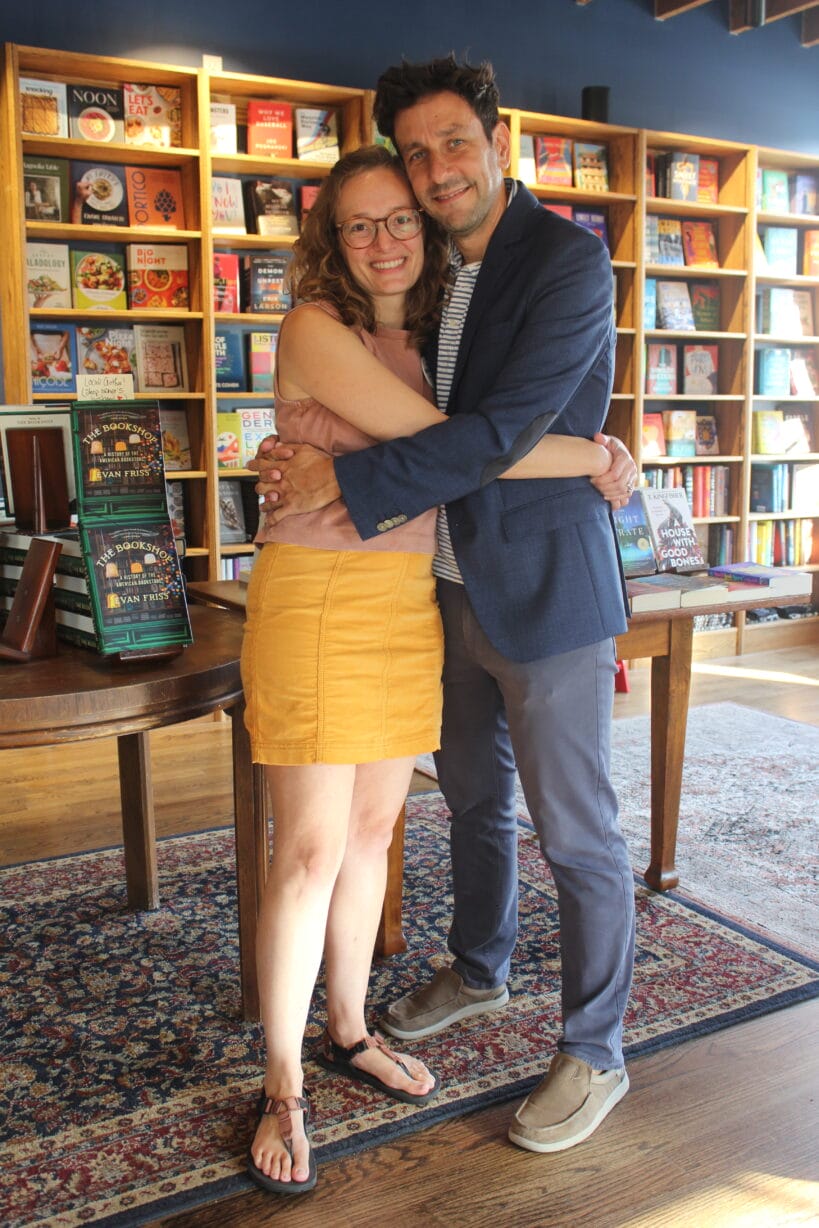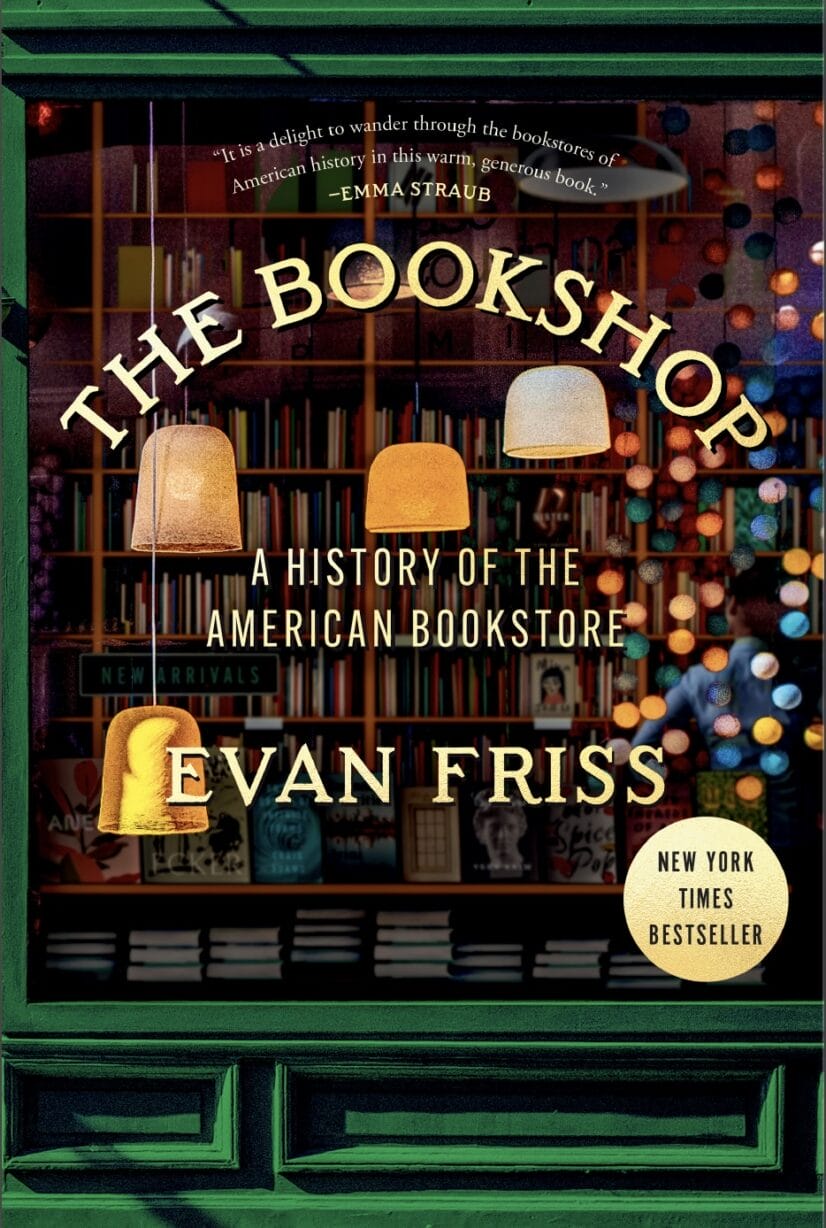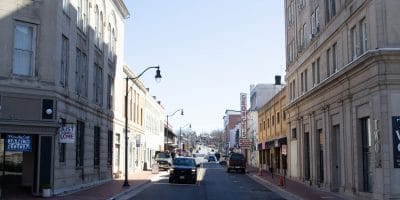By Stephanie Spernak, contributor
First there was the capacity crowd at Parentheses Books for the launch of local author Evan Friss’s new book, “The Bookshop: A History of the American Bookstore.” Then, within a week of its Aug. 6 release, the New York Times reported that sales had propelled it to the top ten bestselling nonfiction titles, a long-odds achievement signifying preeminent publishing success by the author.
Friss, a JMU history professor specializing in U.S. urban and public history, said the inspiration for “The Bookshop”grew out of his appreciation for “how special and unique these spaces are–and can be.”
It’s a subject with deep personal ties – Friss’s wife, Amanda, is the owner of Parentheses Books, which opened in 2023 at the newly renovated Liberty Street Mercantile space at 76 W. Gay Street, across from the Magpie Diner. Before moving to Harrisonburg in 2012, the couple lived in New York City, where Amanda worked at Three Lives & Company, a “magical indie” bookshop as Friss describes it.

In the intro to “The Bookshop” – which Friss dedicated to “all the booksellers (especially Amanda)” – he writes that places like it thrive when they become “community gathering places.”
Indie booksellers, he writes, find the term “bookstore” to be “too commercial” and prefer the term “bookshop.” Similarly, he writes, “customers have an attachment to the shop, and the shop to them, so calling them “customers doesn’t even sound right.”
Friss will give an author talk about “The Bookshop” at the Central Branch of the Massanutten Regional Library on September 12.
The book’s front cover flap describes it as “an affectionate and engaging history of the American bookstore and its central place in cultural life, from department stores to indies, from highbrow dealers trading in first editions to sidewalk vendors, and from chains to special-interest community destinations.”
PEOPLE magazine selected “Bookshop” as one of its Best Books for August 2024, describing it as “a fascinating history of American booksellers and their uniquely important place in society … from Benjamin Franklin’s bookstore in Philadelphia to institutions like New York City’s the Strand to modern favorites like Ann Patchett’s Parnassus Books. A heartfelt, essential love letter to the literary sanctuary of bookstores and the people who run them.”
Another reviewer of “Bookshop” wrote it “is a paean to those magical places and is a must-read to understand why bookshops have been such an integral part of American life for so long, and why they–even in an age of social media–remain an ‘influencer’ today.

Writing “The Bookshop”
Friss told The Citizen that he learned a lot about the “bookstore process, such as stocking and selling books” over dinners with Amanda and noticed how she had “immersed herself in the business.” He was also a regular at Three Lives and was once even asked to help out when the bookstore was short-staffed.
“But book ideas don’t come that easily,” Friss said. “I always think I’ll never have another good idea for a book. But somehow it seems to work out.”
Friss wrote two other books before “The Bookshop.” His first was “The Cycling City: Bicycles and Urban America in the 1890s,” and the second was, “On Bicycles: A 200-Year History of Cycling in New York City.”
While writing “The Bookshop,” Friss drew upon a number of primary sources for his Bookshop research, including oral histories, archival collections, municipal records, diaries, letters, and interviews with booksellers. Along the way, Friss said, he learned “many bookstore owners weren’t terribly bookish.” One example was Craig Rodwell, who founded the Oscar Wilde Memorial Bookshop, near New York University in Manhattan, one of the first gay bookstores in the U.S.
As he was “digging through (Rodwell’s) papers,” Friss said he found a report card that showed a young Rodwell had failed English. After Rodwell opened his bookstore in 1967, Friss’s research showed “he was never terribly literary, but he was an amazing activist who helped chart a critical civil rights campaign.” Friss concluded that “Rodwell thought of the bookstore more as a political headquarters than a literary playground.”
Friss said that his writing process for “The Bookshop” was not much different than what he had experienced writing his previous two bicycle books, with “one notable exception.” This time, Friss “spent a month in residence at MacDowell, a haven for artists in New Hampshire, just outside of Peterborough.” He described this experience as “so ideal, so charming, with so much time to write, with such wonderful food to eat (they deliver lunch to your cabin in a picnic basket), and with such wonderful comradery (brilliant, eccentric writers, painters, poets, etc.).”
Friss’s favorite place to write in Harrisonburg, is the Broad Porch Coffee Co. at Court Square: “I love writing there–the energy, the coffee, the natural light. When I’m there I try not to work on anything else other than my writing,” he said.
Friss names “Goldfinch” and “Secret History” by Donna Tartt as two of his favorite books because “as much as any living writer, she just knows how to tell a story. Her books are full of plot and deliciously written.”
“Going back in time,” Friss said, “I love Jane Jacobs’s ‘The Death and Life of Great American Cities.’ Her perceptions about what makes for a great city are still (mostly) spot on.”
Bookstores and Writers
Bookstores have always attracted writers; many serve as literary salons.
Friss writes that bookseller Frances Steloff, who opened the Gotham Book Mart in New York City during the 1920’s, was particularly supportive of writers struggling through the Depression. Steloff created a Writers’ Emergency Fund to give money “to promising young authors” with “no strings attached.” Henry Miller, among others, was a recipient of the Fund, Friss writes.
Members of a local writing group, the Rocktown Writers Guild (RWG), attended “The Bookshop” launch at Parentheses Books.
Friss introduced James Blakey, secretary of the RWG’s Board of Director, to the Parentheses crowd, designating him the “mayor of the local writing community.” Blakely organizes several monthly events for writers in Harrisonburg and other locations in Rockingham County and surrounding communities.
Parentheses will host a book launch on October 12 for Blakey’s paranormal thriller, “Superstition,” being published by City Owl Press.
Bookstores Are Still Here
Friss writes that in 1961 a bookseller “joked that books have ‘been a dying business for at least five thousand years.'” Booksellers, he writes, worried they faced “existential threats” first from public libraries, then radio, followed by movies, television, mass market paperbacks, superstores, and now the internet.
But bookstores have endured all these threats for over 300 years, because, Friss writes, “they are powerful places. Bookstores, even the little ones, can shape the world around them. They already have.”
Thanks for reading The Citizen, which won the Virginia Press Association’s 2022 News Sweepstakes award as the top online news site in Virginia. We’re independent. We’re local. We pay our contributors, and the money you give goes directly to the reporting. No overhead. No printing costs. Just facts, stories and context. We value your support.













